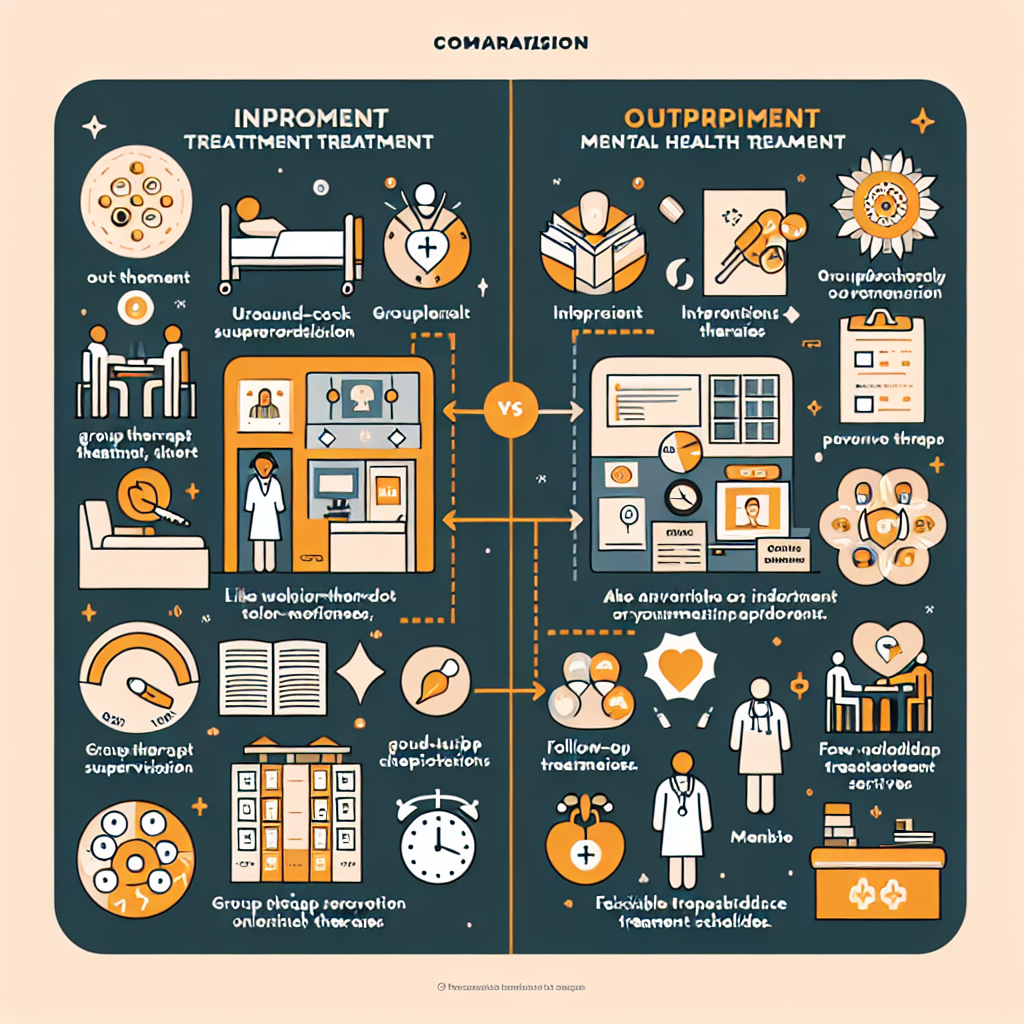-
Table of Contents

“Inpatient treatment provides intensive, round-the-clock care for co-occurring mental health disorders, offering a structured environment that outpatient programs can’t match.”
Introduction
Inpatient treatment programs offer a structured and immersive environment that is particularly effective for addressing co-occurring mental health disorders. These programs provide 24/7 medical supervision, intensive therapeutic interventions, and a controlled setting that minimizes external stressors and triggers. This level of care allows for comprehensive assessment and individualized treatment plans that can address both mental health and substance use disorders simultaneously. In contrast, outpatient programs offer more flexibility and are less intensive, making them suitable for individuals with milder symptoms or those who have already made significant progress in their recovery. Outpatient care typically involves scheduled therapy sessions and support groups, allowing patients to maintain their daily responsibilities while receiving treatment. However, the less intensive nature of outpatient programs may not provide the same level of immediate support and intervention as inpatient care, which can be crucial for individuals with severe or complex co-occurring disorders.
Comprehensive Care: How Inpatient Treatment Provides Integrated Support for Co-Occurring Mental Health Disorders
Inpatient treatment programs offer a comprehensive approach to addressing co-occurring mental health disorders, providing a level of integrated support that is often unmatched by outpatient programs. These residential facilities are designed to create a structured environment where individuals can receive intensive care, round-the-clock supervision, and a multidisciplinary approach to treatment. This holistic model is particularly beneficial for those grappling with multiple mental health issues simultaneously, as it ensures that all aspects of their well-being are addressed in a cohesive manner.
One of the primary advantages of inpatient treatment is the immediate access to a team of healthcare professionals, including psychiatrists, psychologists, nurses, and therapists. This collaborative team works together to develop a personalized treatment plan tailored to the unique needs of each patient. By having all these experts under one roof, inpatient programs can offer a seamless integration of various therapeutic modalities, such as medication management, cognitive-behavioral therapy, and holistic therapies like art or music therapy. This multidisciplinary approach ensures that patients receive comprehensive care that addresses both their mental health disorders and any underlying issues contributing to their condition.
In contrast, outpatient programs often require patients to coordinate their care across multiple providers and locations, which can be challenging and time-consuming. While outpatient treatment can be effective for individuals with less severe symptoms or those who have a strong support system at home, it may not provide the same level of intensive care and immediate intervention that inpatient programs offer. The structured environment of inpatient treatment allows for continuous monitoring and adjustment of treatment plans, ensuring that patients receive the most effective care possible.
Another significant benefit of inpatient treatment is the removal of external stressors and triggers that can exacerbate mental health disorders. By residing in a controlled environment, patients can focus solely on their recovery without the distractions and pressures of daily life. This separation from potentially harmful environments allows individuals to develop healthier coping mechanisms and build a solid foundation for long-term recovery. Additionally, the sense of community and support found in inpatient settings can be incredibly therapeutic. Patients often form strong bonds with their peers, who are experiencing similar challenges, fostering a sense of understanding and camaraderie that can be instrumental in the healing process.
Moreover, inpatient programs often incorporate family therapy and education, recognizing the crucial role that loved ones play in the recovery journey. By involving family members in the treatment process, inpatient facilities help to create a supportive home environment that can sustain recovery efforts once the patient transitions back to everyday life. This focus on family dynamics and education is essential for addressing co-occurring disorders, as it equips both patients and their families with the tools and knowledge needed to navigate the complexities of mental health.
While outpatient programs offer flexibility and the ability to maintain daily responsibilities, they may not provide the same level of comprehensive care and immediate support as inpatient treatment. For individuals with co-occurring mental health disorders, the intensive, integrated approach of inpatient programs can be a crucial factor in achieving lasting recovery. By offering a structured environment, continuous access to a multidisciplinary team, and a focus on holistic well-being, inpatient treatment provides a robust framework for addressing the multifaceted nature of mental health disorders. This comprehensive care model not only addresses the symptoms but also empowers individuals to reclaim their lives and build a brighter, healthier future.
Structured Environment: The Benefits of Inpatient Treatment for Managing Co-Occurring Mental Health Disorders
Inpatient treatment programs offer a structured environment that is particularly beneficial for individuals managing co-occurring mental health disorders. These programs provide a level of stability and consistency that is often difficult to achieve in outpatient settings. The structured environment of inpatient treatment ensures that patients receive continuous care and supervision, which is crucial for those dealing with multiple mental health issues simultaneously. This constant support helps to mitigate the risk of relapse and provides a safe space for individuals to focus solely on their recovery.
One of the primary advantages of inpatient treatment is the comprehensive approach to care. Patients have access to a multidisciplinary team of healthcare professionals, including psychiatrists, psychologists, social workers, and nurses. This team collaborates to create a personalized treatment plan that addresses all aspects of the patient’s mental health. In contrast, outpatient programs may not offer the same level of coordinated care, as patients often have to manage appointments with different specialists on their own. The integrated care model of inpatient treatment ensures that all aspects of a patient’s mental health are addressed in a cohesive manner.
Moreover, the structured environment of inpatient treatment provides a routine that can be incredibly beneficial for individuals with co-occurring disorders. Daily schedules typically include a mix of therapy sessions, group activities, and time for personal reflection. This routine helps to establish a sense of normalcy and predictability, which can be comforting for individuals who may feel overwhelmed by their mental health challenges. The consistency of a daily routine also helps to reinforce positive behaviors and coping strategies, making it easier for patients to maintain their progress once they transition to outpatient care or return to their daily lives.
Another significant benefit of inpatient treatment is the opportunity for patients to engage in intensive therapy. Inpatient programs often offer a variety of therapeutic modalities, including cognitive-behavioral therapy (CBT), dialectical behavior therapy (DBT), and trauma-focused therapy. These therapies are designed to address the underlying issues contributing to the patient’s mental health disorders. The immersive nature of inpatient treatment allows patients to delve deeply into these therapies, often leading to more profound and lasting changes. In contrast, outpatient programs may only offer therapy sessions once or twice a week, which can limit the depth of therapeutic work that can be accomplished.
In addition to therapy, inpatient treatment programs often incorporate holistic approaches to care, such as mindfulness practices, yoga, and art therapy. These activities provide patients with additional tools to manage their mental health and promote overall well-being. The inclusion of holistic practices in the treatment plan can be particularly beneficial for individuals with co-occurring disorders, as it addresses the mind-body connection and helps to reduce stress and anxiety.
Furthermore, the supportive community within an inpatient treatment program can be incredibly healing. Patients have the opportunity to connect with others who are facing similar challenges, which can reduce feelings of isolation and provide a sense of camaraderie. The relationships formed in inpatient treatment can be a source of strength and encouragement, both during the program and in the long-term recovery process.
While outpatient programs offer valuable support and flexibility, the structured environment of inpatient treatment provides a unique and comprehensive approach to managing co-occurring mental health disorders. The continuous care, intensive therapy, and supportive community found in inpatient settings create an optimal environment for individuals to achieve lasting recovery and build a foundation for a healthier future.
Q&A
1. Inpatient treatment provides a structured environment with 24/7 medical and therapeutic support, which is crucial for individuals with severe co-occurring mental health disorders, ensuring immediate intervention and continuous monitoring.
2. Outpatient programs offer more flexibility and allow individuals to maintain daily responsibilities, but they may lack the intensive, round-the-clock care needed for those with complex or severe co-occurring disorders, potentially leading to less comprehensive management of symptoms.
Conclusion
Inpatient treatment for co-occurring mental health disorders offers a more intensive and structured environment compared to outpatient programs. It provides 24/7 medical supervision, immediate access to a multidisciplinary team of healthcare professionals, and a controlled setting that minimizes external stressors and triggers. This allows for comprehensive and integrated care, addressing both mental health and substance use disorders simultaneously. In contrast, outpatient programs offer more flexibility and are less disruptive to daily life but may lack the intensity and immediacy of support found in inpatient settings. Consequently, inpatient treatment is often more effective for individuals with severe or complex co-occurring disorders, while outpatient programs may be suitable for those with milder conditions or as a step-down from inpatient care.



